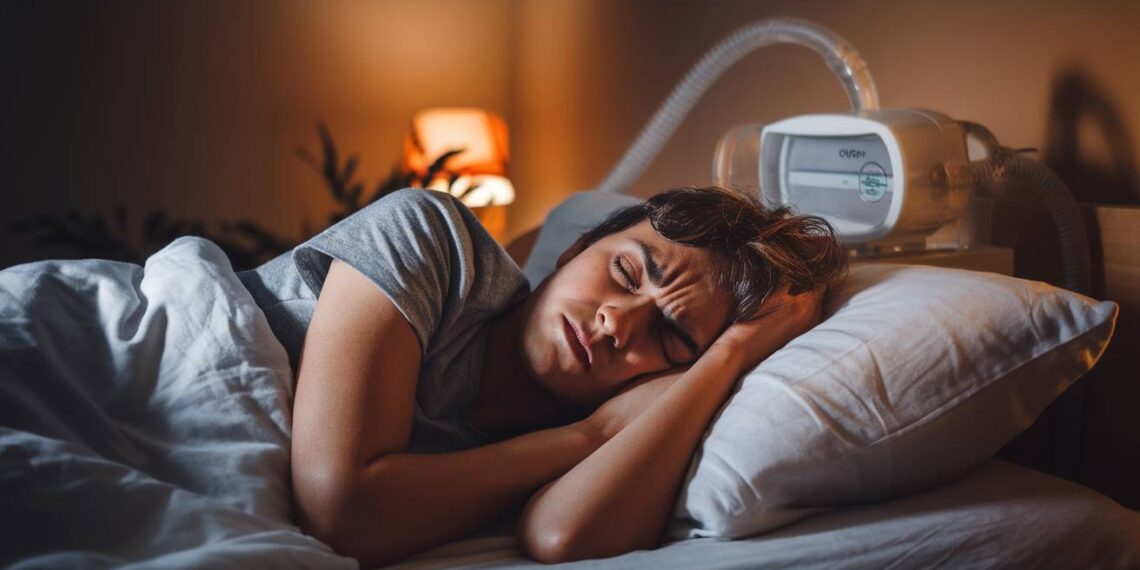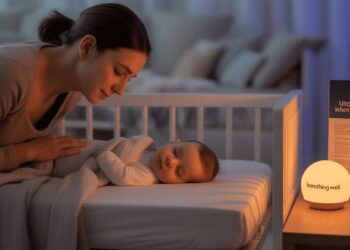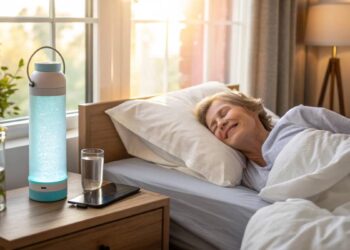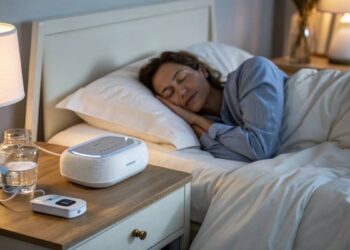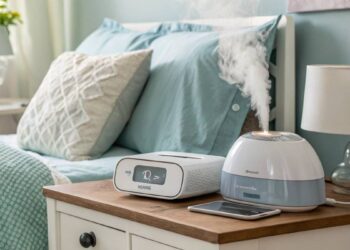Do you wake up feeling more exhausted than when you hit the pillow? Sleep apnea, often brushed aside as “just snoring,” is far more sinister, quietly wreaking havoc on sleep quality and overall health. This underdiagnosed condition doesn’t discriminate, affecting young and old, men and women alike. From lifestyle habits to physical traits, sleep apnea’s causes are multifaceted and deeply impactful. Understanding this condition is the first step toward reclaiming restorative sleep and vitality. Dive in to uncover the culprits behind sleep apnea and arm yourself with knowledge to breathe easy—night after night.
Key Takeaways
- Sleep apnea is a condition where breathing repeatedly stops during sleep, disrupting rest and leading to various health issues.
- The three main types are Obstructive Sleep Apnea (OSA), Central Sleep Apnea (CSA), and Complex Sleep Apnea Syndrome.
- Risk factors include obesity, age, male gender, smoking, alcohol use, and certain medical conditions like diabetes or hypertension.
- Symptoms range from loud snoring and gasping to daytime fatigue and mood swings.
- Treatments include lifestyle changes, CPAP therapy, oral appliances, positional therapy, and surgical interventions.
Understanding Sleep Apnea
Sleep apnea isn’t just for insomniacs or elderly folks—it’s a lurking sleep monster that can catch anyone, though it loves hanging out with those who pack a few extra pounds or have seen 40 birthdays. Let’s demystify this sneaky condition and uncover its secret identities.
What is Sleep Apnea?
Think of sleep apnea as a very rude roommate who interrupts your zzzs with unwanted breathing interruptions. These hiccups in your breathing can crash the party for a few seconds or even roll in repeatedly like an uninvited DJ, lasting several minutes. It’s the serial repeat offender of sleep disrupters.
Most folks with this condition never hit the deep sleep jackpot and get to feel the impact of the oxygen drought in their noggins. They’re often left dragging their feet, unnecessarily snappy, and on the path to further health problems if they don’t kick sleep apnea to the curb.
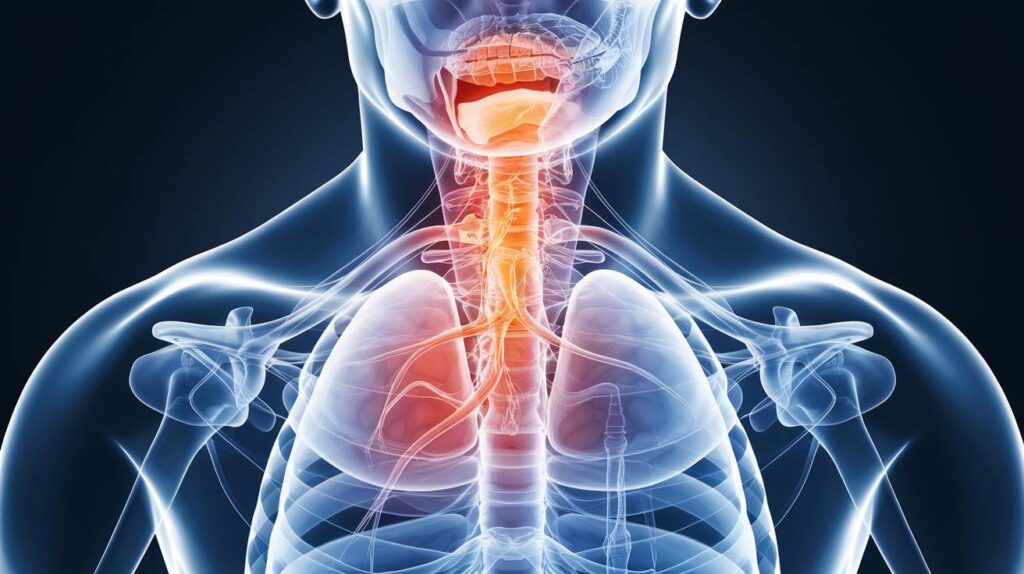
Types of Sleep Apnea
Like a comic book villain with multiple personas, sleep apnea has a few alter-egos. Here’s what you’re dealing with:
| Type of Sleep Apnea | Description |
|---|---|
| Obstructive Sleep Apnea (OSA) | The big cheese of the group, showing up when throat muscles go all weak and lazy during sleep, turning into temporary roadblocks. |
| Central Sleep Apnea (CSA) | The rare breed, kicking in when the brain decides to snooze on the job and forgets to signal the breathing muscles. |
| Complex Sleep Apnea Syndrome | A mash-up of both obstructive and central sleep apnea, giving you the unpleasant traits of both. |
Want to nerd out on the differences between these nemeses? Peek at our article about central vs obstructive sleep apnea. Knowing your sleep apnea’s mood helps in picking the right fix and strategy.
Spotting sleep apnea’s calling cards can keep you and your loved ones informed. For the scoop on what to watch out for, dive into our detailed write-up on sleep apnea symptoms.
Risk Factors for Sleep Apnea
If you’ve ever wondered why you’re waking up tired despite getting what should be a full night of sleep, pondering the risk factors tied to sleep apnea might shed some light. There’s more to this than just restless nights, so let’s dig into the role weight, age, and the way you breathe play in this snooze-sabotaging scenario.
“Sleep apnea isn’t a one-size-fits-all condition—it’s a mosaic of factors from lifestyle habits to anatomical quirks.” – Dr. Lisa Mathews, Sleep Specialist
Weight and Obesity
Carrying a few extra pounds isn’t just a strain on your knees – it can put a toll on your sleep, too. When someone’s packing extra weight, particularly around the neck, those fatty deposits try their best to play traffic police on your airway while you sleep, leading to unwelcome interruptions that scream classic sleep apnea.
Check out this simple breakdown on how your weight brackets you for sleep apnea:
| Body Mass Index (BMI) | Sleep Apnea Risk Level |
|---|---|
| Under 25 (Fit and Fabulous) | Low |
| 25 – 29 (Could Cut Back a Bit) | Moderate |
| 30 – 34 (Pillsbury Doughboy) | High |
| 35 – 39 (Causing a Commotion) | Very High |
| 40+ (Heed the Sirens) | Through the Roof |
If you’re thinking about how shedding some pounds might just kick sleep apnea to the curb, feel free to peep our take on how weight loss helps with sleep apnea.
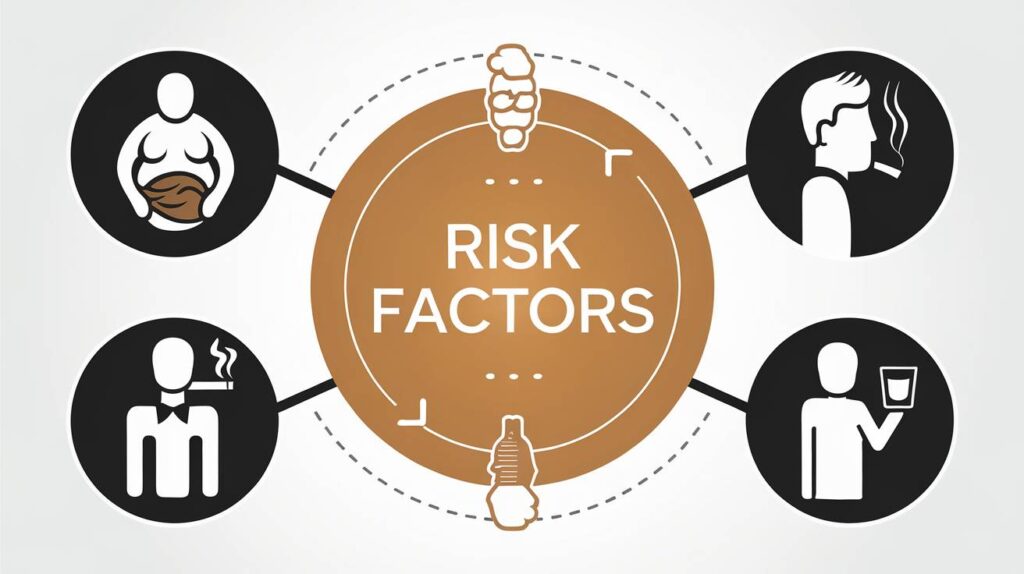
Age-Related Factors
Remember climbing the hill to 40 and beyond? Turns out, it’s more than just collecting candles for your birthday cake. As you age, the risk of sleep apnea takes a hike, too. The change in your muscle tone and airway structure makes it easier for troublesome blockages to set up shop during your snooze fest.
Here’s how your age could be shaking hands with sleep apnea:
| Age Group | Likelihood You’re Hosting Sleep Apnea |
|---|---|
| 30-39 | 10% |
| 40-49 | 20% |
| 50-59 | 30% |
| 60+ | 40% or higher |
Spotting how advancing in years affects your Z’s can help highlight whether it’s time to seek out some professional advice.
Snoring and Breathing Patterns
Ever played the symphony of snores so loud the neighborhood dogs join in? Snoring isn’t just a sign for your partner to nudge you awake – it can be a red flag for sleep apnea. If your nightly sounds also include gasping or turning blue, there’s a good chance your airway’s doing the cha-cha.
Folks dealing with hefty snorers, time to wake up and smell the snoring – especially if it’s coupled with gasping or choking outbursts. Consider giving this a closer look. For insights on pint-sized snoring concerns, navigate over to our piece on pediatric sleep apnea symptoms.
To wrap it up, pinpointing these sleep apnea risk factors isn’t just a matter of self-observation; it’s a reminder that reaching out for medical know-how could be your first step towards catching a peaceful, restorative night’s sleep. Trust us, it’s more than worth it.
Unmasking the Culprits: Causes of Sleep Apnea
What’s really behind sleep apnea? This mysterious condition can be a real snoozer if you’re trying to sort it out on your own. Various factors can tag along and mess with your dreams. Let’s get to the heart, or should I say, throat, of things – exploring how physical attributes, lifestyle quirks, and medical hiccups stir up sleep apnea.
Physical Factors
Some physical traits play a hefty role in triggering sleep apnea. Here’s how they stack up:
| Physical Factor | How It Messes with Sleep |
|---|---|
| Extra Pounds | Carrying more weight, especially around the neck, can make it tricky for air to squeeze through at night. Want to know if shedding pounds might help? Check here. |
| Getting Older | Time changes everything, including tissue strength and muscle tone, which can crimp airway openness. |
| Being Male | Sorry guys, but you’re more likely to catch obstructive sleep apnea than the ladies. |
| Structural Quirks | Got a thick neck, tight airway, or ultra-sized tonsils? They might be behind your midnight breathing woes. |
Worried about these traits? Consider giving a home sleep apnea test a try for some early insights.
Lifestyle and Habits
How we live and what we do (or don’t do) often sneaks into our sleep health. Here’s the lowdown:
| Lifestyle Factor | What It Does to Your Z’s |
|---|---|
| Booze Before Bed | Alcohol makes throat muscles flop and makes it easier for the airway to close up shop. |
| Puffing Away | Smoking stirs up inflammation and can clog the upper airway. |
| Couch-Potatoing | Skipping out on exercise? It can boost weight and mess with breathing patterns. |
| Back Sleepin’ | Catching z’s on your back? Airways can flop shut easier in this pose. Find out what might work better here. |
For those keen on a natural route, sniff around natural sleep apnea remedies for easy options.
Medical Conditions
Certain health issues roll out the red carpet for sleep apnea. Recognizing these can help in dealing with nighttime troubles.
| Medical Condition | What It Means for Shut-Eye |
|---|---|
| Heart Troubles | Hypertension and friends often hang out with sleep apnea. Discover more here. |
| Diabetes Dilemmas | Sugar highs and lows tend to lead the way to sleep apnea town. |
| Hormonal Swings | As hormones take a dip or spike, they can mess with how open or closed airways stay—especially post-menopause. |
| Muscle Issues | If muscle control falters, keeping airways open might be tough. |
Shoring up support is a must, particularly if you’re managing health puzzles. Hunting for alternatives beyond CPAP? Poke around here for fresh ideas.
Nodding off isn’t easy when these rascals are around. Knowing the players can put you in a better spot to handle and maybe even snooze through sleep apnea.
Sleep Apnea in Different Groups
Sleep apnea sneaks up on folks in all walks of life, meddling with sleep based on who you are and how you live. Knowing who’s at risk and how they deal with it can open up doors to catching some better Zs. So, let’s gander at commercial drivers, kids, and post-menopausal women — three groups who tango with sleep apnea in their unique ways.
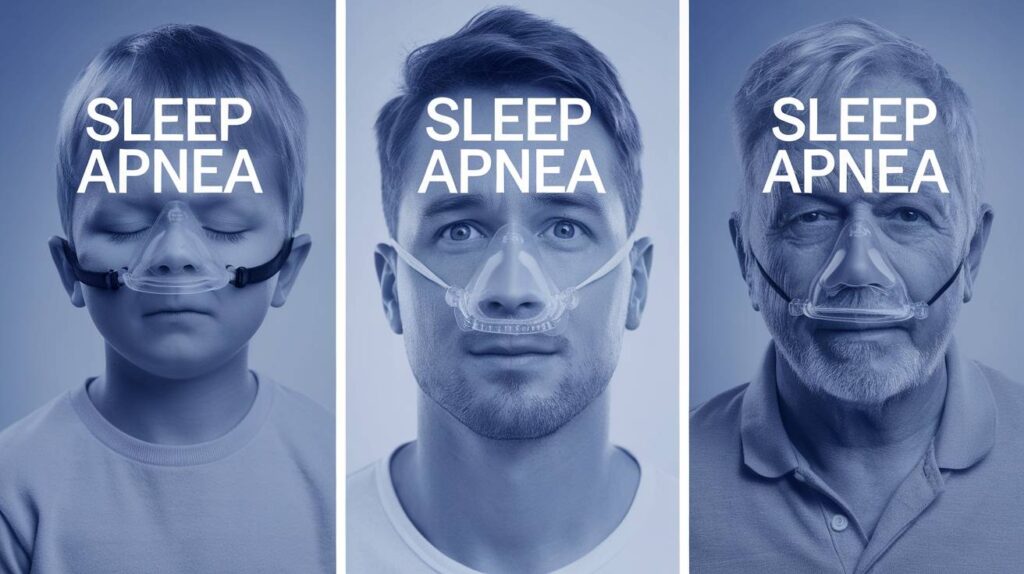
Commercial Drivers and Sleep Apnea
For the road warriors — commercial drivers — sleep apnea isn’t just a snore-fest. We’re talkin’ long hauls and endless highways that make staying awake a chore. That same sleep apnea can turn drowsiness into danger, making crashes more likely.
They’ve got deadlines breathing down their necks and might shrug off sleep troubles. But ignoring sleep apnea not only messes with their health but puts everyone else on the road in harm’s way too. To keep the rubber side down, a home sleep apnea test is often on the checklist for staying licensed.
| What’s Goin’ On? | Why it Matters |
|---|---|
| Sleep-deprived | Higher crash risks |
| Drowsy days | Less focus on driving |
| Health checks | Mandatory sleep exams |
Pediatric Sleep Apnea
Kids need their shut-eye just as much, but sleep apnea’s a party pooper even for them. Think snoring, catching breaths, and sleepiness during the day — not just grown-up issues!
If left alone, kids might hit roadblocks in growing, behaving, and even schooling. Parents clued into pediatric sleep apnea symptoms can step in pronto, making sure their kids dream big.
| What’s Happening | Consequences |
|---|---|
| Sir snores-a-lot | Broken sleep alarms |
| Gasping | Health red flags waving |
| Sleepy school days | School and mood take a hit |
Post-menopausal Women and Sleep Apnea
For women who’ve kicked their periods to the curb, sleep apnea’s an uninvited guest. Hormones throw a rerun, adding a few pounds or making breathing at night tricky.
The cocktail of menopause symptoms and sleep apnea can ruin a good night’s sleep. Sorting through these issues early can flip the switch on their sleep and mood. A good look at natural sleep apnea remedies could bring some peace to the bedroom.
| What’s Changing | What It Means |
|---|---|
| Hormone havoc | Weight scales tipping |
| Getting older | Sleep patterns in upheaval |
| Gaining weight | Sleep apnea risk ticks up |
Understanding what these groups go through means a better shot at tackling sleep apnea head-on. By knowing who’s affected and how, we can rustle up those sleep solutions that make a difference.
Symptoms and Effects of Sleep Apnea
Sleep apnea sneaks in with a bunch of annoying symptoms and can mess with your health in ways you might not expect. Knowing what’s up with these effects is key to taking this condition seriously.
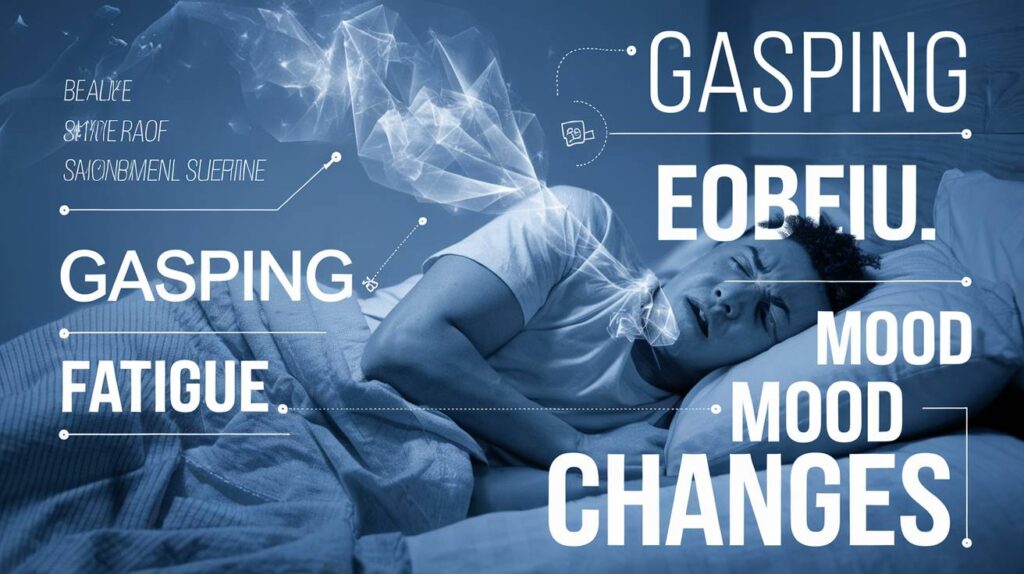
Daytime Fatigue and Sleepiness
Feeling like a zombie during the day? That’s classic sleep apnea. Since your sleep keeps getting disrupted, you’re dragging all day long and it can mess with how you go about your daily grind. With the never-ending yawns come headaches in focusing, a mind like Swiss cheese, and waving goodbye to getting stuff done.
| Impact | Description |
|---|---|
| Fatigue Level | Often hits hard, from moderate to severe |
| Productivity Loss | Your work game might take a hit |
| Risk of Accidents | Keeping your eyes open on the road? Good luck! |
Heart Stuff
Sleep apnea doesn’t play nice with your ticker. Those gulping-for-air moments aren’t just annoying; they’re rough on your heart and up the risk for a heap of health problems. Check out what might happen:
| Cardiovascular Issue | Description |
|---|---|
| High Blood Pressure | Circulatory squeeze leads to higher blood pressure |
| Heart Arrhythmias | Random heartbeats that could freak you out |
| Risk of Heart Attack | Stressing your heart, upping the heart attack chances |
For more detail on how sleep apnea messes with your heart, see our article on sleep apnea heart problems.
Mental and Emotional Rollercoaster
The brain and mood aren’t safe from sleep apnea’s reach. With crummy sleep, you might feel like you’re riding an emotional rollercoaster, complete with the feels of anxiety and possible depression. Here’s a closer look at what you’re up against:
| Mental Health Impact | Description |
|---|---|
| Mood Changes | Snappier than usual and everything gets under your skin |
| Anxiety | A lingering ‘doomsday on the horizon’ feel |
| Depression | Risk for sinking into a gloomy mood goes up |
Spotting these issues is the first step in kicking sleep apnea to the curb. Dive deeper with our guide on sleep apnea symptoms for more signs to watch out for. Getting checked out and treatment isn’t just about sleeping better; it’s all about lifting your mood and boosting your overall health.
Diagnosis and Treatment Options
Figuring out sleep apnea and how to deal with it can be a bit like fixing a jigsaw puzzle—every piece plays a part in seeing the whole picture. Getting it right can seriously boost life quality for folks grappling with this condition.
Sleep Studies and Diagnosis
Nailing down sleep apnea usually kicks off with a sleep study, which—believe it or not—might even happen in the comfort of your own home or at a snooze facility that knows the drill. As you sleep, they’ll keep an eye on a few factors to see what’s going on while you snore away:
| Measurement | Purpose |
|---|---|
| Apnea-Hypopnea Index (AHI) | Tells us how often you stop and start breathing |
| Oxygen Saturation | Checks how much oxygen is cruising through your blood during snooze time |
| Heart Rate | Looks at what your heart’s up to overnight |
For folks worried about possible sleep apnea, you’ve got options. Whether it’s an in-house slumber study or a cozy at-home test, there’s a way to get the ball rolling. If interested, peep the home sleep apnea tests.
CPAP Therapy and Alternatives
CPAP therapy, basically a fan trying to keep your airway at full throttle, is a go-to for serious cases of obstructive sleep apnea. But some folks aren’t fans of being hooked up to a machine all night. Don’t worry; there’s more than one road to Rome:
| Alternative Treatment | Description |
|---|---|
| Oral Appliances | These gadgets scoot your jaw or tongue just enough to keep airways free and clear. |
| Positional Therapy | Devices urge you to side-snooze, tweaking positions to prevent blockage. |
| Surgery | Big guns like UPPP or jaw tweaking for those tricky, stubborn cases. |
Chatting with a doc about alternatives to CPAP can open up new avenues for relief.
Lifestyle Changes and Interventions
Tweaking routines can sometimes pack a punch for sleep apnea relief. Shedding extra pounds helps keep throat tissue from making breathing a challenge. Consider these changes:
| Lifestyle Change | Benefit |
|---|---|
| Weight Loss | Less neck baggage means fewer blockages—see does weight loss help sleep apnea. |
| Cutting Back on Booze and Sleep Pills | Stops the airway from going too chill in the night. |
| Dropping Cigarettes | Keeps airways less inflamed, making breathing easier. |
Build better sleep habits and dig into some natural sleep apnea remedies for an extra hand in feeling more rested.
With the right diagnosis and treatment approach, folks can step up their game against sleep apnea, paving the way for more peaceful and snore-free nights. Getting with the pros ensures that care matches unique needs, hopefully leading to sounder sleep ahead.
Why You Shouldn’t Ignore Sleep Apnea
When it comes to sleep apnea, brushing it off is not the way to go. Knowing why it’s crucial to get help and what could happen if you turn a blind eye might just save you some trouble down the road.
“Treating sleep apnea is more than improving sleep; it’s about safeguarding your heart, mind, and overall health.” – Dr. Richard Nguyen, Pulmonologist
What Happens If You Don’t Treat Sleep Apnea
Skipping out on dealing with sleep apnea can be a ticket to a slew of health woes. Here’s some trouble you could run into if you let sleep apnea slide:
| Risk Factor | What Could Happen Next |
|---|---|
| Heart Stuff | Blood pressure might shoot up, heart attacks, strokes loom |
| Sugar Problems | Insulin doesn’t do its job as well, hello diabetes |
| Brain and Mood | More anxiety, depression, forgetfulness and such |
Putting off sleep apnea fix-it tasks means you’re likely waking up a lot at night. That wrecks your sleep, which only adds more fuel to other health fires you might already be fighting—cue endless tiredness and more doctor visits.
How It Messes with Your Day
The troubles don’t clock out when you wake up. Sleep apnea cramps your style all day long too. Here’s a sneak peek of what’s in store:
| Daytime Fuss | What’s Bothering You Now |
|---|---|
| Tired All Day | You’re dragging at work, might snap at friends and family |
| Brain Fog | Can’t focus, stuff doesn’t get done |
| Grumpy Mood | Snappier and stressed-out more than you’d like |
Your sleep-deprived nights could spell trouble for relationships too. Snoring and wake-ups might have your partner tossing and turning, leaving both of you grumpy by morning. Want more dirt on sleep apnea signs? Check out our scoop on sleep apnea symptoms.
You’re Not Alone – Get Some Backing
Relying on your crew, including family and your doctor, makes tackling sleep apnea less of a hill to climb. With a bit of emotional and hands-on help, the path to treatment seems more doable. Here’s how your squad can join in:
- Get savvy about what sleep apnea really is
- Motivate your loved ones to stay active, like hitting the gym or watching what they eat (does weight loss help sleep apnea)
- Take a peek at different treatments, like good ol’ CPAP machines, or check out other options (alternatives to cpap)
Creating a solid support network can ease the way for those struggling with sleep apnea, helping them to face the hiccups it throws their way and aim for easier breathing and better nights.
Main Tips
- Monitor sleep patterns and symptoms like snoring or fatigue.
- Maintain a healthy weight to reduce the risk of obstructive sleep apnea.
- Avoid alcohol and smoking, especially before bed.
Final Thoughts
Sleep apnea is more than just a snore or restless night; it’s a health condition with cascading effects. The journey to better sleep begins with awareness and action—whether that means seeking a diagnosis, embracing lifestyle changes, or using medical treatments. Remember, prioritizing your sleep is investing in your health and longevity.
Conclusion
Sleep apnea isn’t just a nighttime nuisance—it’s a major health disruptor with far-reaching effects. Left untreated, it can lead to chronic fatigue, emotional instability, and severe health risks like heart disease, diabetes, and hypertension. The good news? Sleep apnea is manageable. Through proper diagnosis, whether via a sleep study or at-home tests, and effective treatments like CPAP machines, lifestyle adjustments, or surgery, you can reclaim your nights and recharge your days.
Awareness is your best defense. Take note of your risk factors and symptoms, consult a professional, and explore treatment options that fit your lifestyle. By addressing sleep apnea head-on, you’re not just improving sleep—you’re enhancing your quality of life, one deep breath at a time.
FAQs
What are the primary types of sleep apnea?
Obstructive Sleep Apnea (OSA) occurs when throat muscles relax excessively, causing blockages. Central Sleep Apnea (CSA) stems from the brain’s failure to control breathing. Complex Sleep Apnea Syndrome combines both types.
What are common symptoms of sleep apnea?
Symptoms include loud snoring, gasping for air during sleep, daytime fatigue, morning headaches, and mood swings.
Who is at risk for sleep apnea?
Individuals with obesity, men over 40, smokers, alcohol users, and those with medical conditions like hypertension or diabetes are at higher risk.
How is sleep apnea diagnosed?
Sleep apnea is diagnosed through sleep studies that measure breathing patterns, oxygen levels, and heart rate during sleep.
What are the treatment options for sleep apnea?
Treatment options include CPAP therapy, lifestyle changes, oral appliances, positional therapy, and in severe cases, surgery.

